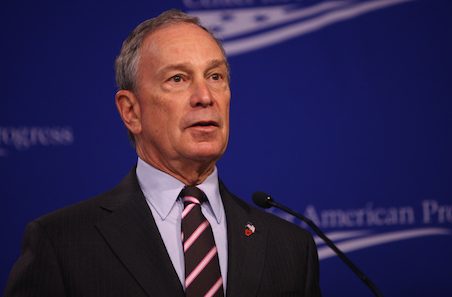A Bloomberg Candidacy Still Makes No Sense

Bret Stephens cheers on Mike Bloomberg’s odd decision to run for the Democratic presidential nomination:
First, he would be a very good president, potentially a great one. Second, he stands a much better chance of beating Donald Trump than anyone in the current Democratic field.
The claim that Bloomberg would be a good president is debatable at best, and there doesn’t appear to be any evidence to support the assertion that he has a better chance of winning than any other Democratic candidate. Stephens is committing the pundit’s fallacy by assuming that the Democratic candidate that he finds least obnoxious must be the most appealing to voters, and he is so ideologically biased against most Democrats and misrepresents their positions so badly that his assessment of what they will do can’t be trusted.
Both of Stephens’ claims are almost beside the point, since it is very doubtful that Bloomberg has any chance of securing the nomination. Bloomberg has repeatedly flirted with the idea of running for president, and until now he has always been smart enough not to do it, but for whatever reason he now intends to waste his money and everyone else’s time with a vanity campaign that has no real constituency among voters. The former mayor of New York could try running on his record, but during his time as mayor he showed why he would have very limited appeal in a general presidential election. He combines intrusive and authoritarian measures with an eager defense of plutocracy. His presidential campaign is itself an expression of that plutocracy reacting against what it perceives to be an unacceptable threat. Bloomberg has been described as a centrist, but he is a “centrist” only in the worst sense of siding with entrenched and powerful interests. This is the “centrism” of catering to corporate interests, pursuing a destructive hawkish foreign policy, and shortchanging the public at home. He would serve as the perfect foil for both Sanders and Warren.
Tina Nguyen summed it up very well in an article last year:
His stubborn brand of plutocratic centrism, as well as his overzealous use of stop-and-frisk tactics, would likely be a nonstarter for progressives, as well as the blue-collar workers who flipped to Trump in 2016.
It would be difficult to think of a worse mismatch between a candidate and a party than Bloomberg and the Democrats. Bloomberg is a multi-billionaire seeking the nomination of a party whose voters tend to view billionaires with a mix of distrust and loathing. Where Sanders and Warren speak to Democratic voters and activists’ concerns about inequality and the concentration of wealth and power, Bloomberg is the walking embodiment of those concerns and he is entering the race in no small part because he rejects the other candidates’ policy ideas.
As for Bloomberg’s foreign policy views, his record will hardly endear him to Democratic voters, either. This is the same man who disgracefully linked the Iraq war with 9/11 in 2004 back when he was still a Republican. He said, “Don’t forget that the war started not very many blocks from here.” Of course, the invasion of Iraq had nothing to do with 9/11, except that the Bush administration cynically exploited the fear produced by the attacks to sell an unjust war based on lies. Bloomberg’s past support for the Iraq war and his willingness to promote Bush administration propaganda at the time will probably come back to haunt him as a candidate.
Finally, Bloomberg’s campaign “strategy” is eerily reminiscent of Rudy Giuliani’s hilarious, failed attempt in 2008. John Cassidy explains:
Did you hear the one about Michael Bloomberg’s plan to win the Democratic Presidential nomination? He’s going to skip the first four primaries and caucuses—in Iowa, New Hampshire, Nevada, and South Carolina—then come storming through on Super Tuesday, March 3rd, when fourteen more states will go to the polls, including three biggies: California, Texas, and North Carolina. A week later, the billionaire former New York City mayor will steamroll his way through more states, including Michigan, Missouri, and Washington, giving him unstoppable momentum as he heads for a general-election battle with Donald Trump.
Actually, it isn’t a joke—or not an intentional one.
This “strategy” is just dripping with entitlement. The idea that any candidate, no matter how wealthy or well-known, can simply “skip” the early contests and expect to be taken seriously as a candidate later on is so arrogant that it is practically begging for voters to repudiate it at the polls. All indications are that most Democratic voters have no interest in what Bloomberg is selling. Cassidy continues:
Just last week, pollsters from Fox News asked a sample of people intending to vote in the Democratic primary how they would react if Michelle Obama, Hillary Clinton, or Bloomberg entered the race. Half said they would definitely vote for Obama, twenty-seven per cent said they would definitely vote for Clinton, and six per cent said they would definitely vote for Bloomberg. Actually, six per cent may overstate Bloomberg’s potential pool of supporters. Nathaniel Rakich, of FiveThirtyEight, notes that Bloomberg “was generally registering around 2 or 3 percent in national primary polls before first taking his name out of consideration in March.”
Bloomberg is undoubtedly a successful businessman, and unlike Trump his success is real, but he is also wildly out of touch with what most Democratic voters believe and want.